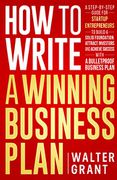
A 5 Minute Overview Of
How to Write a Winning Business Plan
A Step-By-Step Guide for Startup Entrepreneurs to Build a Solid Foundation, Attract Investors, and Achieve Success with a Bulletproof Business Plan
About the Author
Walter Grant is an entrepreneur and business author. On graduation from university, he worked in a corporate job for five years before he quit and went out on his own. His first attempt at starting a business ended in bankruptcy, but he bounced back from that setback to sell his second company for multiple 8 figures. He has since built several successful companies from the ground up.
The Main Idea
Investors don't put money into raw ideas. They need concrete evidence they will get a return on their investment, and that's what a business plan provides. Good business plans always provide information about the three key drivers of the business:

The great thing is business plans don't have to be long winded to be useful. A single page business plan should suffice in most situations. As needed, you can take that 1-page plan, and add more details if you need something longer.
Your 1-page business plan should ideally follow the business model canvas format:

This is a visual tool that enables you to present all aspects of the business plan in a concise and easy-to-understand manner. Since it is a single-page document, it's very easy to quickly present different ideas and analyze the impact of these changes on the business. Using this will bring a much-appreciated order to your daily routine.
A Step-By-Step Guide to a Bulletproof Business Plan
1. Why you need a working business plan. Your business plan sets out your business model — how you will create value for yourself while delivering products and services your customers value. Your business plan is your roadmap on how to do that. A good business plan should be used daily.

2. Cost Structure. Costs always drive a business, and are a key consideration. Business plans need to identify the major cost drivers, and link them to revenue streams. The majority of businesses which collapse have a mismatch between revenues and costs, don't understand their costs fully, or fail to link costs to revenue streams.

3. Revenue Streams. Revenue streams provide the operating income of the business, and will guide decisions on how the business is financed and its overall profitability. A good business plan will make informed forecasts of revenues, costs, and therefore overall profitability.
4. Value Proposition. The Value Proposition specifies the reasons why customers choose your business over your competitors. At its heart, the Value Proposition specifies the benefits that accrue to customers, and should form the foundation of any and all marketing campaigns.
Key Takeaways
- Investors don't put money into raw ideas. They need to see a business plan, which gives them concrete evidence they will get a return on their investment. Like the cliche goes: If you fail to plan, then you plan to fail.
- Business plans don't have to be long-winded to be useful. A single-page business plan should suffice in most situations.
Starting a business is very much like building a LEGO house. You start with the foundation, which is the business plan, and then slowly add more to it. If your business fundamentals are solid, like the foundation of a building, your business is more likely to stand tall and be part of the 10% of businesses that succeed. That solid foundation comes from a solid business plan.
Summaries.Com Editor's Comments
OK, so here's a question if you're a small business owner. When was the last time you looked at your business plan? Or do you even have a business plan? Multiple studies have now shown companies with a written business plan grow on average 30% faster than those that do not. The other key benefit of a business plan in my opinion is preparing one forces you to be specific. You can't get away with vague ideas that crop up when everything is in your head and nothing is down on paper.
So that being said, I liked this week's book, How to Write a Winning Business Plan. Serial entrepreneur Walter Grant makes the point that a single-page business plan is enough. You can bulk it up with more details if needed, but having everything down on a single sheet of paper will give you the big picture. He suggests using the business model canvas format, where you detail your cost structure, your value proposition, and your revenue streams. That 1-page version of your business plan will give you a visual tool that you can use to manage your business more effectively.
Savvy idea, not only for startups, but for every small business. Enjoy the summary.
Want in-depth 30-minute summaries?
In addition to this 5-minute overview, Summaries.Com has a premium 30-minute summary of this book and 1,000+ more, to help you advance your career and business.
Check Out Summaries.com Premium Plans Today!Want more 5-minute Snapshots?
To get a new 5-minute business book snapshot each week, sign up for the Summaries.com free plan.
Sign Up for the Summaries.com Free PlanFast Business Plans 101 Collection
If you enjoyed this summary, here is a collection of related business book summaries, to help you get ideas and strategies that will give you an edge over your competition.
This mini-course will give you ideas on how to put together a business plan fast.
Buy Fast Business Plans 101 Collection (5 x 30-Min Summaries)
How to Write a Winning Business Plan
A Step-By-Step Guide for Startup Entrepreneurs to Build a Solid Foundation, Attract Investors, and Achieve Success with a Bulletproof Business Plan
by Walter Grant
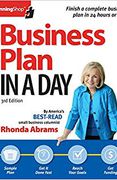
Business Plan in a Day
Get It Done Right, Get It Done Fast!
by Rhonda Abrams
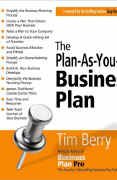
The Plan-As-You-Go Business Plan
by Tim Berry
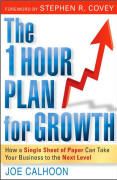
The 1 Hour Plan for Growth
How a Single Sheet of Paper Can Take Your Business to The Next Level
by Joe Calhoon
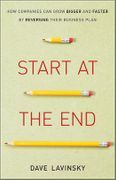
Start at the End
How Companies Can Grow Bigger and Faster By Reversing Their Business Plan
by Dave Lavinsky